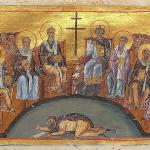
The Christian faith is a faith of hope and love, not fear. Those who think they can use threats to frighten people, and through such fear, make them Christians, have ignored or lost an element of the Christian faith, “for God did not give us a spirit of timidity but a spirit of power and love and self-control” (2 Tim. 1:7 RSV). We are not to be afraid for Jesus has given us his peace: “Peace I leave with you; my peace I give to you; not as the world gives do I give to you. Let not your hearts be troubled, neither let them be afraid” (Jn. 14:27 RSV). Nothing, no evil, should leave us so frightened that we end up despairing for ourselves and those around us. The Christian faith and the peace it gives to us teaches that no evil has any final or authoritative power over us. The Lord, like a good shepherd, guides the world, directing it so that it can and will attain its proper end: “Even though I walk through the valley of the shadow of death, I fear no evil; for thou art with me; thy rod and thy staff, they comfort me” (Ps. 23:4 RSV).
Yes, despite the way we are told to transcend fear, we are also told, “And do not fear those who kill the body but cannot kill the soul; rather fear him who can destroy both soul and body in hell” (Matt. 10:28 RSV). Fear is a part of the human condition. We will experience fear in our lives. We will be afraid, especially of those who can and will cause us pain and sorrow. We are afraid of cruelty. We are afraid of torture. We are afraid of needlessly suffering and even death. We want to live a life free from sorrow, and anything or anyone who threatens that can make us afraid.
We are told not to be afraid, and we find that, in many situations, we can indeed transcend fear; we will come face to face with our fears and overcome them, making sure those things which once made us afraid no longer have the power to do so. Sadly, even with our faith, even with our hope that comes from our faith, there will be things which challenge us and make us afraid. We must fight off such fear with courage realizing courage does not mean we do not sense any fear but we do not let fear dictate to us how we should act. We should not let fear become all powerful, for when we allow it to do so, we slowly find ourselves falling for the greatest kind of dread of all, that is, we start thinking God is wants to cause pain and sorrow, that God will use any possible excuse to condemn us to eternal perdition. That is not what God is like. God is love, and with such love, wants the best for us. By giving his peace to us, Jesus has us experience the truth of that love, and through it, to see through all such fear. Once we are victorious against it, we will find ourselves growing in strength, with the wisdom and grace we need to deal with other fears, so that in the end, we can become as bold and as courageous as Christ, doing all we can to help others: “You take possession of me. I become fearless. I act for the benefit of beings. I leave behind previous wrongdoing completely; never again shall I do another wrong.” [1]
Truly, then, the Christian faith teaches us that Jesus leaves us the peace we need in order to transcend all fear. Threatening people about hell is not spreading good news: teaching people there can be freedom from hell is:
Divine hope uplifts the heart, but fear of Gehenna crushes it. The light of the mind gives birth to faith; faith gives birth to the consolation of hope; hope fortifies the heart. Faith is the unveiling of the understanding. When the mind is darkened, faith is hidden, fear holds sway over us, and our hope is cut off. It is not the faith that comes from instruction which frees a man from pride and doubt, but the faith that is beheld and dawns in the understanding; this is called knowledge and the revelation of truth. As long as the mind perceives God as God by His being revealed to the understanding, fear will not approach the heart. When we are permitted to be in darkness and we lose this perception, then fear will assail us until we are humbled and we draw nigh to humility and repentance. [2]
To overcome fear, we can and should confront it with the peace and grace we have been given. We must bring the light of grace within, to expose the monsters, within and without, which seek to dominate and control us. Demonic powers pounce at us only when we allow them to do so, when we give them power over us. Fear gives them that power. Exposing them to the light, showing both the terrible things they can and do inspire, but also their weakness, their inability to overcome the light when it is exposed, is important. If we try to ignore them and cast them into the darkness within, we only give them a place to thrive and grow and become a threat later in our lives. If we confront them with the spirit of power and self-control that we have been given thanks to grace, we will find their power diminishes until, in the end, they have been cast out and are gone from our lives. This requires us to be willing to look into the darkness, to see the potential monsters in there, to weaken them and their power over us by exposing them to the light. Sometimes we do this by looking deeply into ourselves, but sometimes we are to do this by reflecting upon the pain and sorrow we and others around us have experienced, giving that pain and a name and form, for when we do that, we bind them to those forms, giving us something which we can then expel. This is one of the reasons why telling stories which deal with such dreaded powers is important, for we end up giving a name and form which traps such demonic powers so that all their power is drained from them.
In the end, the greatest horror we will face, the greatest demonic powers we will face, are those powers within which tempt us to do evil; we can make no peace with such horror, we must, instead, courageously fight it until we see Christ’s victory shine within us:
If you think that persecution has relaxed and that you have no quarrel with the enemy, look closely at the hidden centers of your heart. As a diligent inspector enter all the recesses of your soul. Then see if no opposition confronts you, if no tyrant wants to rule in the citadel of your spirit. Do not make peace with avarice, and despise the rewards of unjust dealings. Refuse to make an accord with pride, and fear more to be raised up in glory than to be trampled on in humiliation. Restrain yourself from anger, and do not let the desire for vengeance inflame the resentment of ill will. [3]
So long as we are afraid to confront the evil within, we let the hell of our own making have power over us. We must never let hell have the final say. We must find a way to embrace the courage which Christ has given to us. We must engage the world and the horrors within it. We must consider not only real horrors, but potential ones, so that we can make sure such potential horrors do become realized. We must not let the shadow of death itself distract us from our work. For our eyes should be on Christ, on the peace he gives to us, finding a way to take in that peace and spread it throughout all creation, so that in the end, truly, God will be all in all and all the demonic powers will be abolished for eternity.
[1] Śāntideva, The Bodhisattvacaryāvatāra. Trans. Kate Crosby and Andrew Skilton (Oxford: Oxford University Press, 1995; repr. 1998), 14 [2.9].
[2] Saint Isaac the Syrian, The Ascetical Homilies of Saint Isaac the Syrian. Trans. Monks of the Holy Transfiguration Monastery. Rev. 2nd ed (Boston, MA: Holy Transfiguration Monastery, 2011), 384 [Homily 51].
[3] St Leo the Great, Sermons. Trans. Jane Patricia Freeland CSJB and Agnes Josephine Conway SSJ (Washington, DC: CUA Press, 1996), 363-4 [Sermon 84B].
Stay in touch! Like A Little Bit of Nothing on Facebook.
If you liked what you read, please consider sharing it with your friends and family!
N.B.: While I read comments to moderate them, I rarely respond to them. If I don’t respond to your comment directly, don’t assume I am unthankful for it. I appreciate it. But I want readers to feel free to ask questions, and hopefully, dialogue with each other. I have shared what I wanted to say, though some responses will get a brief reply by me, or, if I find it interesting and something I can engage fully, as the foundation for another post. I have had many posts inspired or improved upon thanks to my readers.












